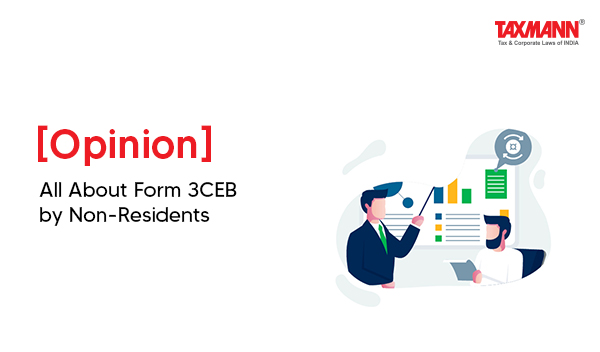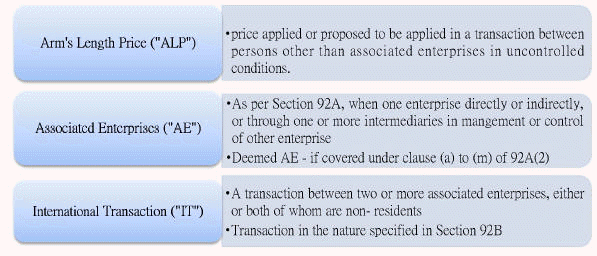[Opinion] All About Form 3CEB by Non-Residents
- Blog|News|Transfer Pricing|
- 3 Min Read
- By Taxmann
- |
- Last Updated on 9 January, 2024

CA Mohit Manav Sharma & CA Mohit Manav Sharma – [2024] 158 taxmann.com 151 (Article)
Birth of Transfer Pricing in India
- India is a globalizing and it depicts rapid increase in the number of transactions, with the foreign countries, by businesses established in India.
- Since the businesses have Multinational Corporations (“MNCs”), hence it also enhances the risks of shifting profit from high tax jurisdiction to no or low tax jurisdiction through inter-group transactions in books at manipulated prices. Thus, it will result into “Tax Arbitrage” for many companies, by executing transactions at their own will.
- In this purview, the concept of Transfer Pricing (“TP”) emerges and TP provisions are introduced in Income Tax Act by introducing Section 92, 92A to 92F vide Finance Act, 2001
To Whom TP Applicable?
On analyzing Section 92, applicability of TP depends upon satisfaction of below setout conditions: –
- There should be an international transaction* or specified domestic transaction*;
*Transactions can be of income as well as of expense - The transaction should be between two or more Associated Enterprise (“AE”)
- When two or more AEs enters into mutual agreement or arrangement for allocation or any contribution to any cost or expense or any allowance of expense
Transfer Pricing Glossary

What to do When TP Applicable?
When the TP provisions are applicable in accordance with Chapter X, the transaction shall be computed having regard to its arm’s length price (“ALP”).
Further Section 92E requires to furnish a report i.e. Form 3CEB from a Practicing Chartered Accountant, if any person entered into an international transaction (as defined under Section 92B).
Now the following question arises:
- Whether TP provisions are only applicable to Resident i.e. Non-Residents are also liable to comply with the TP provisions?
- Whether Non-Residents are also required to report transactions by filing Form 3CEB?
- Whether documentation maintained under Section 92D by Indian AE suffice the requirement for NR AE too?
- Whether there should be any income for application of TP provisions?
Let’s talk about it in ensuing paragraphs!!
Whether TP Provisions are Only Applicable to Resident?
- ‘Resident’ is defined under Section 6, and Non-Resident is the person who is not Resident as per Section 6.
- As per Section 5(2), total income, for the purpose of this Act, of Non-resident includes following: –
- Income received or deemed to be received in India; or
- Income accrue or arises or deemed to be accrue or arises from India.
- By combined reading of Section 92 and Section 5(2), it can be established that: –
- Non-residents are not out of scope of Income Tax Act, 1961 as the income received in India or accrue or arise from India are taxable in India
- There is not any particular exception, which carves out applicability of TP provisions to non-resident.
Thus, considering the aforementioned legal position, Non-residents are also liable to comply with TP provisions, if they are covered under the ambit of Chapter X (Section 92 to 94B).
Click Here To Read The Full Article
Disclaimer: The content/information published on the website is only for general information of the user and shall not be construed as legal advice. While the Taxmann has exercised reasonable efforts to ensure the veracity of information/content published, Taxmann shall be under no liability in any manner whatsoever for incorrect information, if any.

Taxmann Publications has a dedicated in-house Research & Editorial Team. This team consists of a team of Chartered Accountants, Company Secretaries, and Lawyers. This team works under the guidance and supervision of editor-in-chief Mr Rakesh Bhargava.
The Research and Editorial Team is responsible for developing reliable and accurate content for the readers. The team follows the six-sigma approach to achieve the benchmark of zero error in its publications and research platforms. The team ensures that the following publication guidelines are thoroughly followed while developing the content:
- The statutory material is obtained only from the authorized and reliable sources
- All the latest developments in the judicial and legislative fields are covered
- Prepare the analytical write-ups on current, controversial, and important issues to help the readers to understand the concept and its implications
- Every content published by Taxmann is complete, accurate and lucid
- All evidence-based statements are supported with proper reference to Section, Circular No., Notification No. or citations
- The golden rules of grammar, style and consistency are thoroughly followed
- Font and size that’s easy to read and remain consistent across all imprint and digital publications are applied



 CA | CS | CMA
CA | CS | CMA
